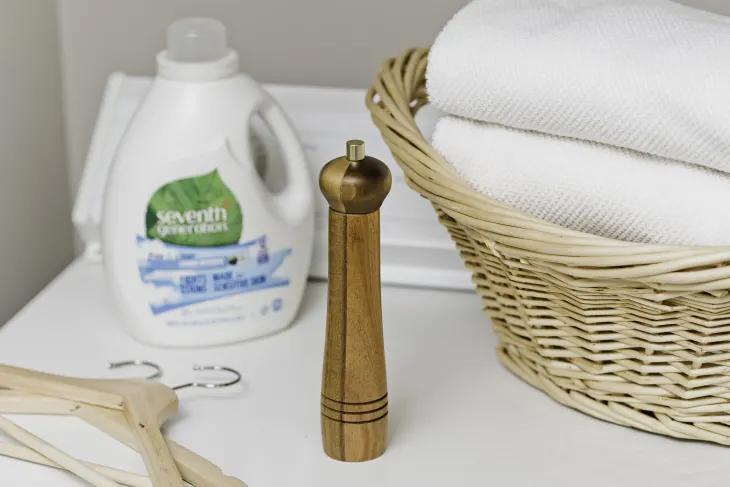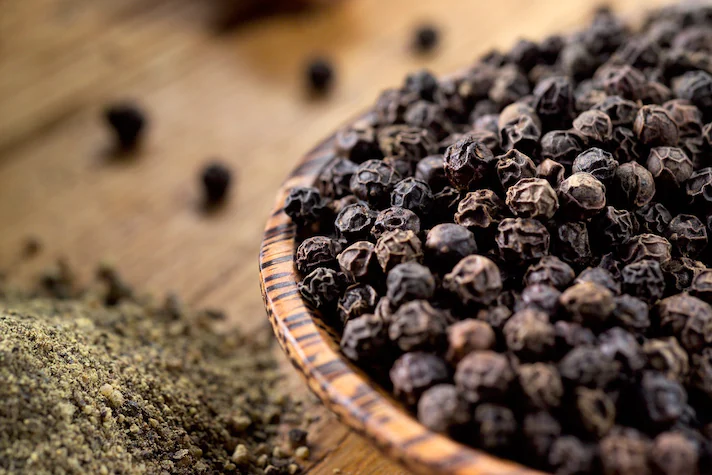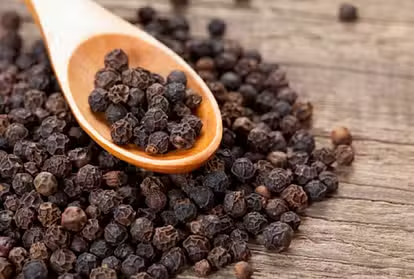Household tricks have been passed down through generations, with some sounding more like folklore than fact. One such intriguing habit is adding black pepper to laundry—something my grandma did religiously. At first, this practice seemed downright odd. Why pepper, of all things? Could it really improve your laundry game, or is it just another quirky old wives’ tale? Let’s dive deep into the history, science, and practicality of adding pepper to your wash.

Grandma’s Secret: A Historical Perspective on Laundry Additives
In the days before commercial laundry detergents dominated the market, people relied on natural or readily available household items to care for their clothes. Vinegar, baking soda, salt, and even pepper were staples in many laundry routines.
Pepper, specifically, was believed to have benefits that went beyond cooking. Passed down through family traditions, its use in laundry likely stemmed from the idea that the abrasive quality of pepper granules could clean fabrics and maintain vibrant colors. While historical documentation is scarce, these age-old tricks often emerged out of necessity and ingenuity, rooted in maximizing the longevity of clothes when resources were limited.
The Science of Pepper: Can It Really Help Your Laundry?
Adding pepper to laundry might sound odd, but the logic behind it has some merit—at least on the surface.
- Color Preservation: One theory is that pepper acts as a gentle abrasive, helping to scrub away soap residue that builds up on fabric over time. This residue can dull colors, so removing it might make clothes appear more vibrant.
- Residue Removal: The fine texture of black pepper granules could help break down leftover detergent in the wash cycle, leaving clothes feeling cleaner and looking brighter.
- Non-Chemical Approach: Unlike some synthetic additives, pepper doesn’t contain harmful chemicals, making it an eco-friendly alternative for those exploring natural laundry hacks.
That said, these claims are largely anecdotal, with little scientific research to back them up.
How Does Pepper Compare to Other Household Laundry Additives?
When it comes to unconventional laundry hacks, pepper isn’t the only contender. Let’s compare it to other tried-and-true household staples:
- White Vinegar: A favorite for softening fabrics and removing odors, vinegar also prevents color bleeding and helps dissolve detergent residue.
- Baking Soda: Renowned for its stain-lifting abilities, baking soda also freshens clothes and neutralizes odors.
- Salt: Often used in new washes to set dyes, salt can minimize color bleeding and fading.
- Lemon Juice: A natural brightener and mild bleach, lemon juice is great for white fabrics.
Compared to these, pepper’s benefits are less understood and less consistent. While it might work as a mild abrasive, its utility is not as versatile or scientifically supported as other natural options.
Anecdotal Evidence: Does Pepper Actually Work?
So, does adding pepper to your laundry actually work? The answer depends on who you ask.
Some swear by its ability to keep colors looking fresh and vibrant, claiming they’ve seen noticeable differences after trying it. Others report little to no change, suggesting it might be more psychological than practical.
Fabric care experts remain skeptical, pointing out the lack of empirical evidence. While they don’t outright dismiss the idea, they often suggest more proven methods for maintaining clothes, like using a high-quality detergent or adding vinegar to the rinse cycle.

Is Pepper Safe for Your Laundry? Potential Risks to Consider
While pepper is generally safe to use in laundry, there are a few things to keep in mind:
- Delicate Fabrics: The abrasive nature of pepper might not play well with delicate fabrics like silk or lace, potentially causing wear over time.
- Skin Sensitivities: If pepper residue isn’t thoroughly rinsed out, it could irritate sensitive skin.
- Machine Safety: While unlikely, there’s always a small chance that fine particles could accumulate in your washing machine over time.
To minimize risks, always use pepper sparingly and ensure your washing machine has a thorough rinse cycle.
Natural Alternatives: Tried-and-Tested Laundry Hacks
If you’re looking for natural ways to enhance your laundry, here are some reliable alternatives to pepper:
- Vinegar: Add 1 cup of white vinegar during the rinse cycle to soften clothes and reduce soap buildup.
- Baking Soda: Sprinkle ½ cup into the wash to lift stains and eliminate odors.
- Salt: Use ¼ cup in the wash to help preserve colors, especially in new clothing.
- Essential Oils: Add a few drops to the rinse cycle for a fresh, natural scent.
These methods are well-researched and widely praised for their effectiveness, making them a safer bet than experimenting with pepper.

Should You Try Adding Pepper to Your Laundry?
If you’re feeling adventurous, there’s no harm in giving pepper a try. After all, laundry is often a mix of routine and experimentation. Adding a teaspoon of black pepper to your wash won’t damage most fabrics, and who knows? It might just work for you.
That said, don’t expect miracles. Pepper’s effectiveness in laundry remains largely anecdotal, and more reliable options like vinegar or baking soda are likely to yield better results.
Conclusion: Is Pepper the Secret Ingredient Your Laundry Needs?
Adding pepper to your laundry might sound odd, but it’s a testament to the creativity of past generations. While the practice isn’t backed by hard science, it’s an intriguing example of how simple household items were used to solve everyday problems.
For those curious enough to try it, pepper is unlikely to harm your clothes and could even provide minor benefits in color preservation. However, proven methods like vinegar, baking soda, and salt offer more consistent results.
Ultimately, laundry is about finding what works best for you. Whether you stick with grandma’s pepper trick or embrace modern hacks, the goal is the same: clean, vibrant clothes that make you feel good. So, why not experiment and see where the spice takes you?


